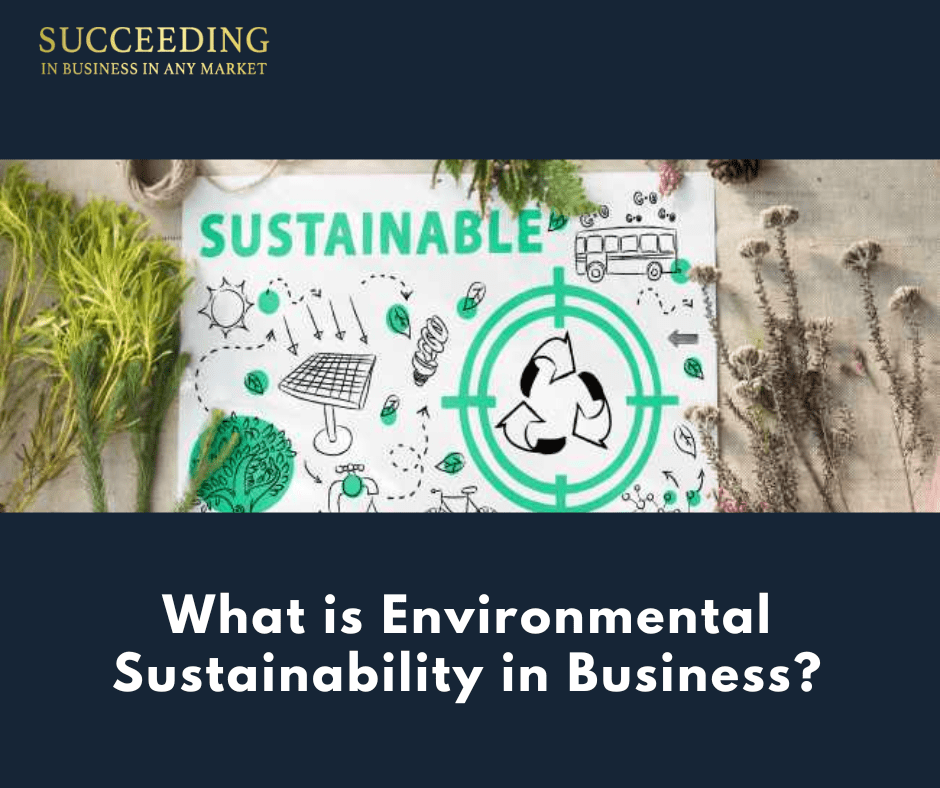Post Date: May 11, 2023

Environmental sustainability has become an increasingly important issue in today’s world, and businesses have a significant role to play in promoting sustainable practices.
In this article Succeeding in Business will explore “What is Environmental Sustainability in Business?”, we will explore various aspects of environmental sustainability in business. We will discuss the importance of sustainability in business, the benefits of adopting green technology, the role of recycling in promoting sustainability, and the challenges companies face when committing to sustainability.
Additionally, we will cover how to measure business sustainability and who can contribute to improving sustainability in business. By the end of this article, readers will have a better understanding of environmental sustainability in business and how it can be achieved.
Understanding Environmental Sustainability in Business
Environmental sustainability refers to the practice of meeting the needs of the present without compromising the ability of future generations to meet their needs. In the context of business, environmental sustainability means that companies should operate in a way that minimizes their impact on the environment while still meeting the needs of their stakeholders.
Why is Environmental Sustainability in Business Important? ((https://online.hbs.edu/blog/post/what-is-sustainability-in-business))
- There are several reasons why environmental sustainability is important in business. One of the most significant reasons is that it helps to protect the environment and the natural resources that we rely on. By implementing sustainable practices, businesses can reduce their carbon footprint, conserve energy and water, and minimize waste.
- Another important reason why environmental sustainability is crucial in business is that it can help to improve a company’s reputation. Consumers are becoming increasingly aware of the impact that businesses have on the environment, and they are more likely to support companies that are committed to sustainable practices.
- Finally, environmental sustainability can also help to reduce costs for businesses. By minimizing waste and conserving resources, companies can save money on energy and water bills and reduce their overall operating costs.
Benefits of Environmental Sustainability in Business
There are several benefits of environmental sustainability in business, including:
Cost Savings
Sustainable business practices can help companies reduce costs by optimizing resource use, reducing waste, and improving efficiency. For example, energy-efficient lighting and equipment can reduce electricity bills, and recycling programs can reduce waste disposal costs.
Competitive Advantage
Companies that prioritize sustainability can gain a competitive advantage by attracting customers who value sustainability and differentiating themselves from competitors who do not prioritize sustainability.
Positive Reputation
Sustainable business practices can help companies build a positive reputation and enhance their brand image. Customers are more likely to do business with companies that prioritize sustainability and are perceived as socially responsible.
Improved Employee Morale
Employees are more likely to be engaged and motivated when they work for a company that prioritizes sustainability and environmental responsibility. Sustainable business practices can also help create a sense of purpose and social responsibility among employees

How to Adopt Environmental Sustainability Practices in Business
Adopting environmental sustainability practices in business involves assessing the company’s environmental impact, setting sustainability goals, and implementing sustainable practices. Here are some steps that businesses can take to adopt sustainable practices:
Assessing Environmental Impact
To assess environmental impact, companies can conduct an environmental audit to identify areas where they can reduce their environmental impact. This can include energy use, waste disposal, water consumption, and greenhouse gas emissions.
Setting Sustainability Goals
Setting sustainability goals involves identifying specific targets and metrics to measure progress. This can include reducing energy consumption by a certain percentage, increasing the use of renewable energy sources, or reducing waste by implementing a recycling program.
Implementing Sustainable Practices
Implementing sustainable practices involves taking action to achieve sustainability goals. This can include installing energy-efficient lighting and equipment, implementing a recycling program, reducing water consumption, and adopting sustainable transportation practices.
Implementing Sustainable Practices in Business
There are several ways that businesses can implement sustainable practices to minimize their impact on the environment. Some of these include:
1. Reducing Energy Consumption
Businesses can reduce their energy consumption by implementing energy-efficient practices such as using LED lighting, installing solar panels, and using energy-efficient appliances.
2. Conserving Water
Businesses can conserve water by implementing water-efficient practices such as installing low-flow toilets and faucets, fixing leaks, and using water-efficient landscaping.
3. Minimizing Waste
Businesses can minimize waste by implementing recycling programs, reducing paper usage, and composting organic waste.
4. Using Sustainable Materials
Businesses can use sustainable materials such as recycled paper, bamboo, and hemp to reduce their impact on the environment.
Biggest Challenges When Companies Are Committed To Sustainability
While committing to sustainability can bring numerous benefits to businesses, there are also several challenges that companies may face. Here are some of the biggest challenges when companies are committed to sustainability:
- Cost: Implementing sustainable practices can require significant investments in equipment, technology, and training. These costs can be a challenge for smaller businesses or those with limited resources.
- Resistance to change: Employees, suppliers, and customers may be resistant to changes in operations and practices that are necessary to achieve sustainability goals. This can lead to resistance to change, lack of support, and slower progress.
- Lack of standards: There are no universally accepted standards for sustainability, which can make it difficult for companies to benchmark their progress and measure their impact. This can also make it difficult for consumers to compare the sustainability of different products and services.
- Complexity of supply chains: Sustainable practices often require changes throughout the supply chain, which can be complex and difficult to manage. Companies may need to work closely with suppliers and partners to ensure that sustainability is integrated throughout the entire chain.
- Lack of consumer awareness: Consumers may not be aware of the importance of sustainability or may not be willing to pay more for sustainable products and services. This can make it difficult for businesses to invest in sustainability initiatives without a clear return on investment.
- Greenwashing: Some companies may make false or misleading claims about their sustainability practices in order to attract customers. This can undermine the credibility of sustainability efforts and make it more difficult for businesses that are genuinely committed to sustainability to stand out.
Who Can Improve Business Sustainability?
Improving business sustainability is not the sole responsibility of any one individual or group. It requires a collaborative effort from multiple stakeholders, including:
- Business leaders: Business leaders have a crucial role in promoting sustainability within their organizations. They can set sustainability goals, implement sustainable practices, and communicate sustainability efforts to employees, customers, and other stakeholders.
- Employees: Employees play a key role in implementing sustainable practices within organizations. They can help reduce energy consumption, waste generation, and water use, and promote sustainability through their actions and behaviors.
- Customers: Customers can influence business sustainability by making sustainable choices when purchasing products and services. By choosing sustainable products and services, customers can help incentivize businesses to adopt more sustainable practices.
- Suppliers: Suppliers can contribute to business sustainability by providing sustainable products and services and promoting sustainable practices throughout the supply chain.
- Governments: Governments can promote sustainability by implementing policies and regulations that incentivize sustainable practices, such as tax credits or subsidies for renewable energy sources and energy-efficient technologies.
- Non-governmental organizations (NGOs): NGOs can play a role in promoting sustainability by raising awareness, conducting research, and advocating for policies and practices that promote sustainability.
WHAT ARE THE ADVANTAGES OF GREEN TECHNOLOGY?
Green technology, also known as sustainable technology, offers numerous advantages over traditional technology. Here are some of green technology advantages ((https://webheadtech.com/blog/benefits-of-green-technology)):
- Reduces carbon emissions: Promoting the use of renewable energy sources like solar, wind, and hydropower, which do not emit carbon dioxide or other harmful greenhouse gases. By reducing carbon emissions, we can help slow the pace of climate change and protect the environment.
- Conserves natural resources: Helping to conserve natural resources by reducing the amount of raw materials and energy needed to produce goods and services. This can help to preserve natural resources like water, forests, and minerals for future generations.
- Reduces waste: Promoting the use of recycling, composting, and other waste-reduction methods to reduce the amount of waste generated by society. By reducing waste, we can save natural resources and reduce the amount of waste that ends up in landfills.
- Increases energy efficiency: It promotes the use of energy-efficient products and practices, which can save businesses and consumers money on energy bills. By increasing energy efficiency, we can also reduce our dependence on fossil fuels and promote the use of renewable energy sources.
- Creates jobs: It has the potential to create new jobs and industries, particularly in the areas of renewable energy and energy efficiency. By investing in green technology, countries can promote economic growth while also promoting sustainability.
- Improves public health: It can help to reduce air and water pollution, which can have negative impacts on public health. By promoting clean energy and reducing waste, we can create healthier communities and improve quality of life.
- Builds a positive reputation: Consumers are increasingly aware of the importance of sustainability, and are more likely to support businesses that are committed to reducing their environmental impact. By adopting green technology and sustainable practices, businesses can build a positive reputation and attract environmentally-conscious consumers.
Overall, It offers numerous advantages over traditional technology, including reduced carbon emissions, conservation of natural resources, waste reduction, energy efficiency, job creation, improved public health, and a positive reputation. By promoting green technology, we can create a more sustainable and equitable future for all.
Conclusion
Environmental sustainability is an essential issue for businesses to consider in today’s world. By implementing sustainable practices, businesses can protect the environment, improve their reputation, and reduce costs. It is essential for companies to take a proactive approach to environmental sustainability and prioritize sustainable practices in their operations.
FAQs About Environmental Sustainability in Business
Environmental sustainability in business refers to the practice of conducting business operations in a way that minimizes negative environmental impact and promotes the long-term health and well-being of the planet. It involves adopting sustainable practices such as reducing greenhouse gas emissions, conserving natural resources, and minimizing waste generation.
Sustainable practices in business include reducing energy consumption, conserving water, minimizing waste, and using sustainable materials.





